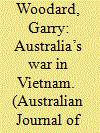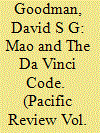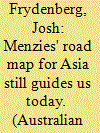|
|
|
Sort Order |
|
|
|
Items / Page
|
|
|
|
|
|
|
| Srl | Item |
| 1 |
ID:
152003


|
|
|
|
|
| Summary/Abstract |
Australia’s commitment in Vietnam can be interpreted as a small ally drawing its superpower partner into war for its own ends. Two studies by eminent Australian authors throw light on the role of human agency, and in so doing bring Australian historiography of the war closer to the trend in the United States. Peter Edwards’s history just about describes Vietnam as ‘Menzies War’. However, he finds no new sources on Menzies’s mindset, and diminishes the roles of his foreign ministers, Garfield Barwick and Paul Hasluck. The late Geoffrey Bolton’s intimate biography of Hasluck shows him as an active minister and also that his private papers are thin on Vietnam, the part of his distinguished career on which he never wrote. The Cabinet meeting of 17 December 1964 reveals much more about Australian decision-making on going to war than can be gleaned from Edwards’s cursory treatment and Bolton’s second-hand account. Barwick’s different approach, and even Hasluck’s last-minute caution, show Australia had a choice. Barwick, if he had remained Foreign Minister, might have kept Australia out of the Vietnam war, so freeing it to continue to play a leading regional political role.
|
|
|
|
|
|
|
|
|
|
|
|
|
|
|
|
| 2 |
ID:
074431


|
|
|
|
|
| Publication |
2006.
|
| Summary/Abstract |
During the last decade three books have had a disproportionate impact on China Studies because of their controversial interpretations: Jenner's The Tyranny of History, which predicts the disintegration of the Chinese state; Menzies' 1421: The Year China Discovered the World, which describes how Chinese sailors circumnavigated the globe well before any Europeans; and Jung Chang and Jon Halliday's biography Mao: The Unknown Story. All are revisionist histories that amongst other (usually controversial) conclusions suggest there has been a conspiracy to keep the information they convey hidden. Considering their arguments and the manner of their enquiry and expression is interesting in more general ways about the construction of narrative and the nature of conspiracy, as well as about the lessons for academic research.
|
|
|
|
|
|
|
|
|
|
|
|
|
|
|
|
| 3 |
ID:
138157


|
|
|
|
|
| Summary/Abstract |
This is an excerpt from the 2014 Sir Robert Menzies Lecture, delivered by the Honourable Josh Frydenberg, the Parliamentary Secretary to the Prime Minister and the Federal Member for Kooyong, on August 14, 2014, in the Queen's Hall at the Parliament of Victoria, Melbourne. In these remarks, I argue that Sir Robert Menzies oversaw a paradigm shift in our understanding of our neighbours and in our neighbours' understanding of us. He did so by repositioning Australia among the rising powers of Asia and by creating a coherent framework of regional engagement. For too long, the political opponents of the Liberal Party of Australia have propagated a myth that it was only Labor that truly understood our region and capitalised on its opportunities. This is patently false. The explicit denigration of Menzies and, in more recent times, John Howard and Tony Abbott for their approach to Asia should be exposed for what it is: ideologically driven, partisan polemics, which bear no resemblance to the facts. Paul Keating is wrong to suggest that in order for Australia to achieve, in his words, our ‘destiny in Asia and the Pacific’, we must somehow change our national identity and the nature of who we are. Foreign policy is about advancing the national interest and must never be a proxy for reshaping our nation's identity by stealth. As Shakespeare said, ‘What's past is prologue’, and only if we can truthfully understand the past will we be ready for the future.
|
|
|
|
|
|
|
|
|
|
|
|
|
|
|
|
|
|
|
|
|